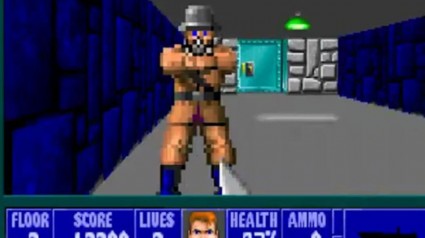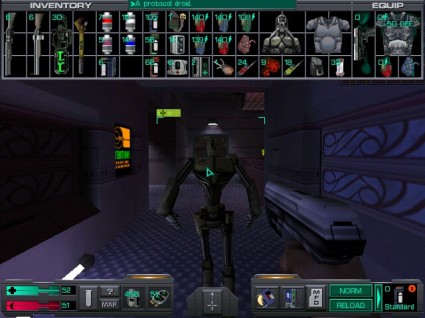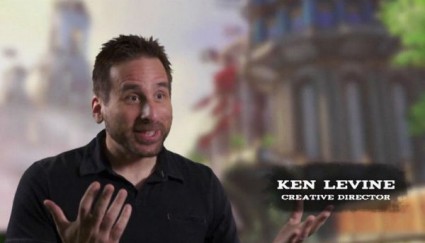Editorials
Why BioShock Infinite will save the first-person shooter
February 13, 2013, Author: Trent Pyro
Since its birth in the form of the legendary Wolfenstein 3D, the humble first-person shooter has evolved into a blockbusting, technology-pushing beast of a genre. Often at the forefront of innovation and graphical prowess, such is the thirst for more realistic-looking dismemberment, games such as Doom, Quake, Unreal and Halo have not only advanced and expanded what was expected of their own genre but made technological leaps and taken huge risks that have paid off for gaming as a whole.
I’m sure by now you’ve noticed the absence of Call of Duty in my little love-letter to shooting games. My disdain for the series aside, I cannot deny that it has almost single-handedly elevated the FPS from ‘geeky toy for the hardcore’ to the ultra-popular medium it is today. However, its penchant for sacrificing innovation for output regularity and its status as Activision’s prime cash cow, often to the detriment of other IPs, has turned it into almost a watchword for what many FPS developers are now trying vehemently to avoid.
The need to emulate what sells the most while balancing it with innovation has led to many a failed attempt and if it wasn’t for one studio, headed by a highly-respected director, I would be pretty confident in saying that the future of the FPS was a horrible khaki-green bleak. I think BioShock Infinite will save the genre and here’s why.
NOTE: I will be referencing key events in BioShock and the Call of Duty series so look out if you’re cautious of spoilers folks!
Where did it all go wrong?
Before I can put forward my argument supporting that admittedly hyperbolic statement, I first think we need to understand why the genre needs saving at all. Before we start, let me say I adore a good FPS. In fact, I even enjoy a half-decent one. There’s nothing like sitting back, switching off the old brain box and hammering that Right Trigger until the number of digital deaths on your conscience resembles something close to Rambo. Yet while it’s always good fun, it doesn’t do much for the furtherance of our beloved entertainment medium. As I stated in the introduction, this hasn’t always been the case.
Back in the day, while Mario and Sonic were fighting for the side-scroller crown and a hundred hopeful developers desperately worked to usurp either one of them, a little-known studio viewed the entire parade with a smirk and a knowing smile. Disinterested in the ancient genre, they’d been confidently forging their own on home computer platforms: the first person shooter.
Taking cues from homebrew titles like 3D Monster Maze, id Software took the genius step of putting a gun in front of the bobbing camera. While there’s more to it than that, it’s hard to understand now (unless you were there of course) how much of an impact Wolfenstein 3D had when it was released. For the first time, shooter fans were able to become the character, to look right into the whites of their enemy’s pixellated eyes as they pulled the trigger. They even got to give Hitler a bloody nose if they were good enough.

This was the shit back in the day.
id popularised a grim and bloody atmosphere with DOOM and helped get online multiplayer off the ground with Quake. Epic developed the now massively used Unreal Engine for its namesake game, making the LAN Deathmatch an absolute staple of the FPS genre. Dreamworks Interactive brought the genre back to its WW2 roots with Medal of Honor and Rare set the benchmark for the 64-bit era with the legendary Goldeneye.
Further innovation came with the next generation of consoles, with Halo redefining the genre with its almost open-world levels and compelling, cinematic narrative. Call of Duty, already massively popular on the PC platform, made the leap to consoles with CoD: Finest Hour and proved that Dreamworks weren’t the only ones who could do WW2 shooters well.
All this time, many other developers attempted to capitalise on the growing popularity of the FPS with varying results. For every Ironstorm: World War Zero there was a Brothers in Arms. The basic pattern of emulation plus gimmickry has been going on for decades, and even today it’s plain to see the smaller developers trying to capture what the big boys manage to. While said big boys continued to push boundaries and sell millions, there began a creeping feeling that something was not quite right. One developer was reshaping a much-loved series into the biggest thing to happen to gaming since the GameBoy and no-one could’ve guessed how big a change it would make.
CoD fever
Call of Duty: Modern Warfare pretty much took over the world. Within months, it was raking in zillions for its publisher, Activision, and long-time CoD developer Infinity Ward were picking up awards and industry kudos by the bucket-load. The sweet blend of cutting-edge gameplay, gorgeous graphics and an action-packed, Hollywood blockbuster plot marked the most bombastic FPS ever created and gamers adored it. The multiplayer, however, took on a life of its own.
While not initially toppling long-time leader Halo from the Xbox LIVE top spot, the sheer popularity it gained was nothing short of astonishing. It was rapidly hailed as the greatest multiplayer of all time and soon enough literally millions of people worldwide were enjoying it every single day. Videos flooded YouTube as creative (and not so creative) gamers shared their experiences with a world in shock.
Every gaming forum became littered with conversations regarding ‘killstreaks’ and ‘K/D ratios’. More than any game before it, Modern Warfare cemented the FPS as the daddy of video-games and almost overnight the genre became more profitable than anyone could have possibly imagined.
All this appeared to be positive, despite mothers groups and anti-violence lobbyists condemning the game; and on the surface it was. Video-games received more attention from more sources than ever before, and questions were being asked about the treatment of a medium that can make millions in a single day with just one release. Long-time detractors couldn’t deny that gaming was quickly becoming more popular than it ever had been. However, behind the scenes a horrible vacuum had been created through a nasty mixture of success and fear.

What every dev boss felt like after Modern Warfare hit…
While it was innovation that had originally led Modern Warfare to its throne, Activision quickly realised that the very same thing could topple it in an instant. People had so much love for the game, for its details and nuances, for the things that made it so irresistible, that any change would risk alienating millions.
While many series have faced this problem across the time-scape of video-gaming, none have been so feverishly adored as CoD. It’s like FIFA suddenly deciding footballers are allowed to grab the ball; the entire football supporting community would go nuts overnight. Certain things created by Infinity Ward suddenly became laws of nature that could not be changed. So enamoured were fans by the status-quo, that even the thought of small adjustments sent many into a frenzy.
Activision, now firmly holding the reigns of Infinity Ward, had a difficult decision to make. Live up to the genre’s beloved history by further pushing its boundaries, or stick to the norm and rake in the assured cash. For boss Bobby Kotic, the answer was simple. Do the latter and get extremely rich.
Putting aside the insidious, business-like handling of a creative medium, this caused major scarring across the gaming world. With the release of Modern Warfare 2, many writers and journos began to see what had happened. Offering a continuation to the story (which many now saw as playing second fiddle to the multiplayer), a few multiplayer tweaks and little else, it showed that Activision were totally fine with shamelessly selling gamers the same game twice; and they had the balls to charge an extra fiver for it.
The aforementioned scarring came in the form of a wave of uncertainty hitting many smaller studios developing FPS games. While they must’ve known that success on a CoD level was unlikely, they also had to accept that a new standard had been set. If the Left Trigger didn’t aim your gun, there would now have to be a damn good reason why not. If grenades weren’t readily available on the bumpers, there would be hell to pay. While Bungie (having established its own control set-up for Halo) had the weight and fan-love to care little, anyone wanting to succeed with an FPS after ‘COD-Day’ had to emulate it to some degree or face mass apathy.
Modern Warfare’s focus on multiplayer, whether originally intended or not, also had an effect. Many fresh FPS games already in development had to be retrofitted with often ill-thought-out multiplayer modes, sometimes almost copying CoD to the letter. Games that were intended to be single-player experiences were given tumorous Deathmatch modes, more out of necessity than by design. Any FPS worth its salt now needed a multiplayer or it faced instant relegation and failure.
While it’s hard to imagine things being this serious, you only have to look at the figures to know I’m right. While other IPs have been released to some success over the last few years, none have even come close to matching CoD’s meteoric rise and many have suffered for it. Even across the broader gaming landscape, the thought of releasing a game in the same season as the next iteration of CoD strikes fear into publishers worldwide, and only the real power-players such as Bethesda, Microsoft, EA and Ubisoft can release alongside the military beast with assured confidence. Even Bioware backed off, releasing the last two Mass Effect games in Q1 and Dragon Age whenever they felt like it.
So enough of my bitching; we all know CoD changed things forever. I’m sure the question burning in your mind after that overlong dissection of the ‘CoD effect’ is: what the fuck has this got to do with BioShock? Well, I’m about to tell you. Oh, and as it’s the best example of exactly the kind of FPS we need less of, I’ll be referencing CoD a lot, so keep your hair on fan boys…
Going their own way
Irrational Games have always done exactly what they want, regardless of the current trends. In 1999, when the rest of the industry was content with releasing survival horror cash-ins and action shooters, Irrational released System Shock 2. A seamless blend of FPS, survival horror and RPG progression, it paved the way for future hits like Deus Ex and BioShock.
Critically acclaimed and cited in numerous ‘Greatest Games of All Time’ lists, its poor sales only confirmed that it was way ahead of the curve. It combined permanent choice game-play with an insidious AI foe that crucially betrayed the player at a key point in the plot. Much of the development team were unhappy with this design decision but creative director Ken Levine stuck by it, and System Shock 2 became one of the most influential games of its generation.

It doesn’t look like much now, but back then it changed the face of gaming…
It’s this willingness to do something fresh and to do it right that gives me confidence that Levine and co. will save the FPS from a dull, khaki future. Irrational are a prime example of how innovation can sit alongside commercial appeal and how listening to your fans and taking care of them pays future dividends.
People play CoD because they enjoy the multiplayer, and as long as Activision don’t charge too much for map packs and keeps the content coming (until the next inevitable, annual release) they know the fans won’t go anywhere. Irrational don’t see their fan-base as a resource to be tapped, but instead the recipients of entertainment that Irrational are in charge of. They assume a duty of care and strive to ensure that anything they put out is worth playing for more than one reason.
They also seem to genuinely worry about being bland. While Treyarch seem happy with simply updating CoD‘s geriatric multiplayer and slapping a ‘2’ after the title of the game, Irrational make decisions based on whether something of value will be added to the experience.
The proof is in the pudding
Example one: Irrational are willing to tackle difficult issues and situations with care, consideration, and above-all, confidence. The steampunk world of Columbia is rife with vicious racism, reminiscent of a pre-Civil Rights America, and there’s a vein of exceptionalism that runs through the entire city. Not easy things to tackle, but it seems as if Levine wouldn’t be content with weaving a story devoid of difficult social issues.
BioShock dealt with dystopianism and the ‘means to an end’ pursuit of one man to create a perfect city. It also revisited the betrayal concept seen in System Shock 2 and gave it a boost to create one of the most gut-wrenching twists in any game story to date. The standard FPS can’t handle social problems like racism; you’re often too busy gunning down waves of non-American troops for any attempt at a cerebral approach to be worthwhile. Imagine Mason wittering on about the fragility of racial relations seconds after the game tasked you with annihilating an entire camp of African militants. It’s almost laughable.
What Irrational are doing is creating environments where violence is possible but not inevitable. A gang of rough-looking men may initially seem like a threat but if you don’t touch your weapons and just pass on by, there’s a chance they won’t even pay you any attention, let alone open fire. The FPS has become a glorified shooting gallery, and no better example exists than BLOPS 2.
Having played it recently I can safely say I was bored shitless. Ferried by banal cut-scenes between varying locations that seemed to be desperately trying to add variety while sticking two fingers to any logical plot devices, none of the slaughter had any meaning; and worst of all, enemies seemed to be little more than targets to hit. While this makes sense from a military standpoint, from a gamer’s perspective it’s almost insulting.
It’s as if Treyarch are terrified of giving us a side of context with our fillet of destruction, the threat of alienating the most numb-minded of CoD fans ever-present. The truth is that, contrary to the impression you get playing online, many CoD players are not stupid and these days the campaigns are often avoided not simply in lieu of the multiplayer, but because they’re fucking terrible.

Will he shoot you if you don’t draw your gun? What will his friends do if you make a move?
The simple fact that Irrational are making violence a result of numerous combining factors already adds a new dimension to proceedings. If those men over there don’t shoot you on sight, why not? If they do, the fact that not every single group does raises the question as to why this group has. Of course these questions will often be asked and mulled over after the fact, due to the focus on the tension created by no combat or the adrenaline-rush concentration of surviving combat; but that’s beside the point. The fact that we’re asking questions about shooting people in the face at all is a step in the right direction, and especially since it dodges the usual ‘is any killing right?’ moral hippie bullshit.
Another good example is Elizabeth. Those of you who’ve been following Infinite’s development will already be familiar with the plucky, intelligent young girl whose expedience from the clutches of Columbia’s powers that be is Booker’s chief mission. The choice to give the player a constant companion is never easy and has failed far more than it’s been successful. Even Ashley in Resident Evil 4 was nothing but a constant irritation.
Elizabeth can tear holes in the fabric of reality to give you an advantage in battle as well as find ammo and point out escape routes. While she’ll stay out of trouble as much as she can, she’s not invincible and you will have to keep an eye on her. However, Levine has identified that in order to make a companion character worth protecting, he has to make us feel something for them outside of combat. In his own words:
“If you’re a gamer, you know what the words ‘escort mission’ mean to you. That’s never a good thing… the moment the player feels Elizabeth is a burden, that’s the moment we lose them for her.”
With that concept in mind, Irrational are creating an Elizabeth who will feel as much a part of the experience, narrative and events as protagonist Booker, to the point where we now can’t think of one without the other. I haven’t even played the game yet but I’m already confident that the removal of Elizabeth for some reason would be a great detriment to the experience because, as I mentioned before, she wouldn’t be there if the developers didn’t think she added something important to proceedings.

Irrational don’t intend for Elizabeth to be the only one shedding tears in this scene…
To compare, the death of Soap in Modern Warfare 3 instilled absolutely zero emotion in me. This guy who I’d been in the first Modern Warfare title and fought alongside for the next two was lying there, bleeding to death on a table and I didn’t give a shit. It wasn’t that I didn’t like the guy (he’s voiced by one of my favourite actors), it was simply that his character had been given so little depth outside his function. I can imagine his eulogy going something like this:
“Soap McTavish was a good soldier. He was gruff and cool and Scottish. He was pretty good at climbing ice walls and driving a skidoo. He could also take unending punishment from firearms until the fateful day when the story dictated that he had to die. Oh, and he had a cool haircut.”
While I’m not a fan of overly fleshing out a character and can’t stand it when others cite boring home scenes and pointless ‘interactive cut-scenes’ as character development, there is certainly a line between boring the player with every detail of a character’s life and leaving them so barren they might as well be a stick with a gun.
Finally, before I ramble on so much your brain begins to dribble from your ears, the distinct lack of multiplayer in BioShock Infinite is I think the most obvious resistance to the modern FPS norm. While BioShock 2 (crucially NOT developed by Irrational) featured a tacked-on and weak multiplayer component, it was perceived to be simply trying to conform to the trend of every shooter having some sort of online mode. Safe to say, only the true believers still play it today. Infinite will not feature multiplayer of any sort, for two very good reasons.
Firstly, it’s a single-player experience. BioShock has always been about being taken on a journey of discovery and mystery in a fantastical location and having to use your wits, planning and knowledge to survive. It’s not all about quick-reactions and getting headshots; if you’ve failed to stock the right ammo or pre-prepare for the fight, you’re doomed to fail. This elevates it above the standard shooting range many FPS games end up being and for that reason a multiplayer just devalues the entire experience. At least, a conventional one does, and that brings me on to the second reason.
They couldn’t figure out a way to do it differently. Saying more about the state of FPS multiplayer than just BioShock, that statement for me encapsulates why Irrational are hopefully going to give the genre the shot in the arm it desperately needs. Rather than stick a samey and traditional Deathmatch-style multiplayer into Infinite, ruining the purity of the single-player experience and making little to no sense in-world (although I have no doubt they would’ve tried to avoid that), they worked for months on numerous ideas to try and do something original.
All their concepts failed for one reason or another, the chief one being that none of them were good enough. Some would call omitting an almost requisite mode from an almost-certainly blockbuster title business suicide; I call it customer care.

I trust this guy has my best interests at heart. Do you?
Where do we go now?
I may be wrong. BioShock Infinite might turn out to be a shitty FPS and all the preview material, all of Ken Levine’s reassuring words and all the demos that the big journos have played could just be created solely to give a false impression of a decidedly average title. I’m not the only one who’s worried and there are many who are actively seeking to expose Irrational as bullshitters; and maybe they are.
What cannot be disputed, however, is the way they approach what they do. Rather than consider what is going to make the game sell the most copies, they put things that will thrill and enthrall the player at the top of the list. They consider what they want to see in the game, what no-one has managed to do before, and set that as their goal. They rise to the challenge and work hard to bring fresh and fantastic experiences to us. Most of all, they don’t take us for granted and never treat us like idiots.
To Levine, a generic cover is just a tool used to attract those who wouldn’t usually be interested in a BioShock game, and the negative fan reaction to it goes to show how much we care about keeping the franchise sacred and safe from the influence of its FPS peers. The creation of a reversible cover, with a more fan-favorite design on the inside, as well as the public vote to choose the alternate design and the availability of even more printable covers online, shows that Irrational care about us too. Let’s meet back here on March 26th and we’ll see if I’m right.
Tagged Activision, Adventure, Bioshock: Infinite, Black Ops, Call of Duty, civil rights, companion, Deus Ex, Elizabeth, expeptionalism, first person shooter, Gameplay, halo, Infinity Ward, irrational games, ken levine, Mordern Warfare, Multiplayer, Online, questions, Racism, RPG, System Shock 2, Treyarch, Violence


